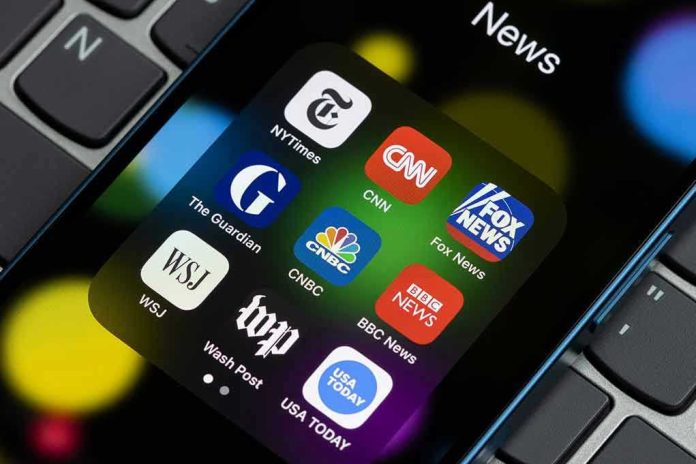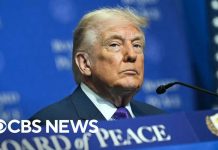
Donald Trump’s recent threat to sue the BBC for $1 billion over alleged defamatory content is more than just another media dispute; it’s a potentially precedent-setting challenge to international media freedom.
Story Highlights
- Trump demands an apology from the BBC over perceived defamatory coverage.
- The president threatens a $1 billion lawsuit if demands are not met.
- This confrontation raises questions about media accountability and freedom.
- The case could have significant implications for international defamation law.
Trump’s Latest Media Showdown
Donald Trump has never shied away from confrontation with the media, and his recent threat against the BBC is no exception. Accusing the British broadcaster of airing defamatory content, Trump has demanded a public apology and warned of a $1 billion lawsuit if his demands are not met. This latest episode is a continuation of Trump’s long-standing battle with media outlets, which he often accuses of bias and “fake news.”
The incident reportedly stems from a live broadcast or published content that Trump claims was misleading or incorrect. While exact details of the broadcast remain unclear, the stakes are high, as Trump’s legal threat could result in a protracted battle over international defamation laws. This scenario is particularly complex given the differences between US and UK legal standards, with the UK historically being more favorable to plaintiffs in defamation cases.
BBC’s Position and Potential Responses
The BBC, known for its editorial independence, finds itself in the crosshairs of a high-profile legal threat. As a publicly funded broadcaster, the BBC is accustomed to scrutiny and criticism but has rarely faced the prospect of a lawsuit from a US president. The corporation’s response will likely be measured, balancing the need to defend its editorial standards while navigating the legal complexities of Trump’s demands.
So far, the BBC has not issued a public apology or indicated any intention to capitulate to Trump’s demands. Legal experts suggest that while the lawsuit threat is significant, the BBC may have confidence in its legal standing, given its adherence to editorial guidelines and the complexities of international defamation law.
Implications for Media Freedom and Defamation Law
This case could have far-reaching implications for media organizations worldwide. A successful lawsuit by Trump might embolden other public figures to pursue similar legal actions against international media outlets, potentially stifling journalistic freedom. It could also lead to closer scrutiny of defamation laws, with potential reforms aimed at balancing freedom of the press with the rights of individuals to protect their reputations.
The international nature of this dispute highlights the challenges media organizations face in maintaining editorial independence while operating across different legal jurisdictions. The outcome could set a precedent for how such cases are handled in the future, potentially impacting media coverage of controversial figures and events.
Political Ramifications and Public Opinion
Beyond the legal and journalistic implications, Trump’s confrontation with the BBC also carries political weight. For Trump, this move is consistent with his strategy of controlling media narratives and rallying his base against perceived media bias. It serves as a reminder of his influence in the political landscape and his ability to command media attention.
Public opinion is divided, with some viewing Trump’s actions as a legitimate defense of his reputation, while others see it as an attempt to intimidate and silence the media. This division underscores the broader debate over media freedom, accountability, and the role of powerful figures in shaping public discourse.
Sources:
NY Times: Trump’s history with media
Reuters: Trump’s previous lawsuits
Harvard Law Review: Defamation law in UK and US
Guardian: Defamation law analysis
Brookings Institution: Trump media strategy
Columbia Journalism Review: Trump media lawsuits









